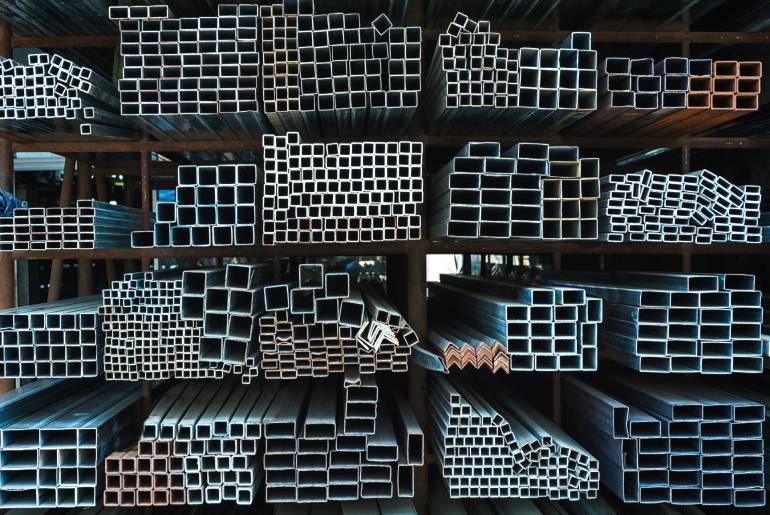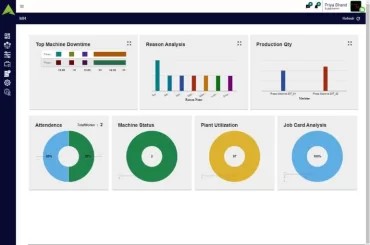The Metal forming industry is a complex industry that involves the manufacturing of metal products using various forming techniques, such as forging, rolling, extrusion, and stamping. To monitor the productivity of assets in this industry, some key performance indicators (KPIs) that can be useful include:
Production efficiency: This KPI measures the efficiency of the production process in terms of output per unit of time. It can be calculated by dividing the total output by the total hours worked.
Downtime: This KPI measures the amount of time that production equipment is unavailable due to breakdowns, maintenance, or other issues. Reducing downtime can improve productivity and profitability.
Cycle time: This KPI measures the time it takes for a product to go through the entire manufacturing process, from raw materials to finished product. Shorter cycle times can increase production capacity and efficiency.
Scrap rate: This KPI measures the amount of waste or defective products produced during the manufacturing process. Reducing scrap rates can increase profitability and efficiency.
OEE (Overall Equipment Effectiveness): This KPI provides a comprehensive measure of equipment performance, taking into account availability, performance efficiency, and quality rate.
Lead time: This KPI measures the time it takes to deliver a product to the customer from the time the order is received. Shorter lead times can improve customer satisfaction and increase competitiveness.
Inventory turnover: This KPI measures how quickly inventory is sold or used up. Higher inventory turnover indicates better asset utilization and improved cash flow.
Energy consumption: This KPI measures the amount of energy consumed during the manufacturing process. Reducing energy consumption can lower costs and improve environmental sustainability.
By monitoring these KPIs, metal forming companies can identify areas for improvement and make data-driven decisions to improve productivity and profitability.
The metal forming industry has traditionally relied on manual labor and mechanical processes to produce metal components. However, with the increasing adoption of digital technologies, digitization is transforming the industry, offering several advantages:
Increased efficiency: Digitization allows metal forming companies to streamline their production processes, reducing manual labor and optimizing workflows. Automation of certain tasks also leads to higher efficiency and productivity.
Improved quality: Digitization provides greater control over the manufacturing process, enabling manufacturers to detect and correct quality issues more effectively. Quality control measures can be automated and monitored in real-time to improve product quality.
Enhanced flexibility: Digital technologies enable metal forming companies to quickly adapt to changes in demand and production requirements. With digital tools, manufacturers can easily adjust production schedules, change product specifications, and respond to customer requests.
Reduced costs: Digitization helps metal forming companies reduce costs by optimizing production processes, reducing waste, and minimizing downtime. Automation can also lead to lower labor costs and reduced risk of workplace injuries.
Improved data analysis: Digitization enables metal forming companies to collect, store, and analyze data from their production processes, allowing them to identify trends, detect issues, and make informed decisions about production and process improvements.
Increased innovation: Digitization enables metal forming companies to leverage new technologies and processes, opening up new opportunities for innovation and product development.
Improved customer satisfaction: Digitization allows metal forming companies to respond quickly and accurately to customer requests, providing them with high-quality products that meet their specific needs.
Digitization offers significant advantages to the metal forming industry, including increased efficiency, improved quality, enhanced flexibility, reduced costs, improved data analysis, increased innovation, and improved customer satisfaction. This can also be termed as Manufacturing Intelligence that embraces digital technologies, and help metal forming companies to remain competitive and continue to drive growth in the industry.
Manufacturing intelligence refers to the use of data, analytics, and artificial intelligence to optimize manufacturing processes and improve production outcomes. In the metal forming industry, manufacturing intelligence can be used to improve the efficiency and quality of the forming process.
One way manufacturing intelligence can be used in the metal forming industry is through the implementation of sensor technology. Sensors can be used to collect data on various aspects of the forming process, such as temperature, pressure, and material properties. This data can then be used to optimize the process parameters and improve the quality of the finished product.
Another application of manufacturing intelligence in metal forming is through the use of machine learning algorithms. Machine learning can be used to analyze the data collected by sensors and other sources, identify patterns, and make predictions about the behavior of the forming process. This can help operators make real-time adjustments to the process, reducing defects and improving overall quality.
Manufacturing intelligence can also be used to improve supply chain management in the metal forming industry. By collecting data on raw materials, production processes, and finished products, manufacturers can gain insights into their operations and make informed decisions about inventory management, production scheduling, and other aspects of the supply chain.
Overall, manufacturing intelligence has the potential to revolutionize the metal forming industry by optimizing processes, improving quality, and reducing costs. As technology continues to advance, we can expect to see more and more applications of manufacturing intelligence in this and other industries.
If you are interested in knowing how our Asset Intelligence Platform can help you achieve your digitization goals, feel free to talk to us and we will walk you through how our Manufacturing Intelligence solution works and how it can help you achieve your business targets and maximize the asset efficiency considerably.
Inteliiot is a tech-enabled company that unleashes the power of IoT to help you improve your business using various services. By helping our customers create more goods and services while using fewer resources, we at Inteliiot are contributing towards building leaner and more responsible supply chains.





